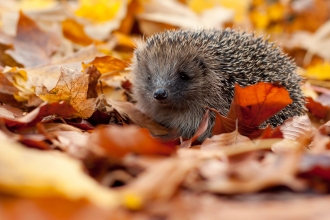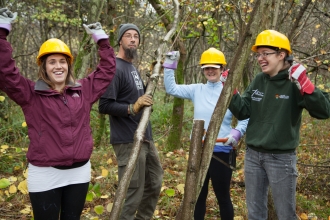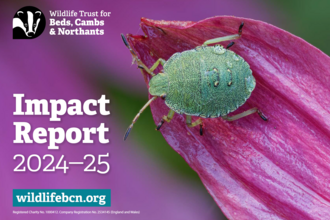We are always looking for passionate, dedicated and resourceful people to join us. If you have an interest in nature conservation, we would love to hear from you.
About the Trust
We are part of a national movement of Wildlife Trusts and work locally in Bedfordshire, Cambridgeshire and Northamptonshire.
We have a big mission - we want to stop nature's decline. To achieve this big ambition we have set four priority areas:
- We will make Bedfordshire, Cambridgeshire and Northamptonshire wilder
- We will undertake more research to better understand our wildlife and what it needs
- We will inspire more people to love and take action for nature
- We will work nationally when it benefits wildlife locally
Our commitment to Equality, Diversity and Inclusion
We’re wild about inclusion! We want our people/staff to be as diverse as wildlife. As an inclusive employer we recognise that our workforce needs to better reflect the communities in which we live and work.
We actively encourage applications from people of all backgrounds, identities and cultures. We believe that a diverse workforce will help us create our vision of ‘people close to nature, with land and seas rich in wildlife.
I can genuinely say that as an organisation, the Wildlife Trust is very welcoming and inclusive for women and supportive of women's careers.Great Fen Project Manager
Sustainability at Wildlife BCN
As a conservation organisation, we are committed not only to promoting and helping others to prioritise environmentally friendly practices, but also to ensuring our own work is conducted as sustainably as possible. There are many ways in which we do so – from solar panels, composting and harvesting rainwater for our wildlife gardens, to encouraging the procurement of office materials and paper from recycled and sustainable sources (including the paper our Local Wildlife magazine is printed on, and posted in).
Much of our work protecting and restoring habitats (e.g. chalk grasslands, woodlands and peat fenlands) often prevents carbon dioxide from being released into the atmosphere. However, this doesn’t mean we can be complacent, as we need to reduce our own carbon emissions as much as we can. The covid pandemic has helped us review our working practices and use of work space. Hybrid working means that we’re reducing staff travel. We are reducing paper and energy through having moved over to digitalising our office files. We are also moving to a new generation of tools and equipment for our Reserves staff powered by electricity, which is much better for the environment if this electricity is provided from greener renewable sources like wind and solar.
At Wildlife BCN we are fortunate to have so many staff who are so committed and passionate about the environment and such a wealth of expertise and enthusiasm from which we can draw on. We have a sustainability group who meet regularly to share ideas and drive forward progress, as well as a number of staff acting as sustainability champions across our sites and a sustainability manager who is working to develop better ways for us to monitor, manage and reduce our impacts across waste, recycling, transport, water, carbon and energy. We recognise that there’s still lots more we need to do. So we’re collaborating with others across our UK wide movement of Wildlife Trusts and others to share ideas and solutions to bring about tangible changes to minimise the footprint of our charity.
We are a Disability Confident Committed employer (level 1).
Find out more on the Government website here
Staff benefits
Financial Support
- Pension Contributions: The Trust’s contribution to staff pensions is 8%, automatic enrolment after 3 months service
- Death in Service: 4 x annual salary paid to nominated beneficiaries
- Professional Fees: Professional fees paid for staff who belong to a professional organisation/body, which is relevant to their role
- Cycle to Work Scheme: Interest free loans for travelling to work
- Discounts: Cotswold Outdoors - 20% discount
Professional development and socialising
- Training and Development
- Employee Voice (staff advocacy group)
- Corporate Clothing Allowance (role dependent)
- Staff Away Days: 2 days per year, one in summer and one at Christmas
- Staff Social Club: pub quizzes and other events arranged throughout the year
Work-life balance
- Flexible Working
- Concessionary Trust Closure Days: Between Christmas and New Year
- Career breaks (sabbatical)
- Compassionate Leave
- Annual Leave: 25 days plus bank holidays, increases with length of service
Health and Wellbeing
- Physiotherapy Appointments
- Paid annual Flu Jab
- Pilates (online classes)
- Counselling Service
- Employee Assistance Programmes
- In House Mental Health First Aider
- Paid Annual Eye Tests
Meet some of the team
I joined the Supporter Engagement Team in February 2020 and really enjoy working with, and for, people who care about our local wildlife as much as I do.Supporter Engagement Team
Laurie Harper, Supporter Engagement Manager
When you contact our Wildlife Trust, it’s likely that your first contact will be with Laurie Harper, our Supporter Engagement Manager, or one of her team.
Team players
"I started working in the Supporter Engagement Team in 2015 and became its manager in October 2019. There are six of us looking after over 34,000 members and we also help and support anyone else who may have an interest in our cause.
The work ranges from keeping membership details up to date, responding to wildlife queries by phone and email, to engaging with members face to face and recruiting new supporters at events. It involves anything to do with membership, such as responding to members wishing to increase their subscription in support of our work, or answering how our Trust is responding to national or international conservation issues.
We want people to feel energised by their interaction with us, to feel happy that they understand our position and to know that the Trust is here to make a difference for the wildlife they love and that our team can help them practically. Some of our work is member-specific, but we run activities for everyone, such as our photo competition. If you have an interest in wildlife anywhere in our three counties, we are here to help."
Dive in
"I have always had a passion for wildlife, right from school days, but my career path took a different direction within the financial industry followed by customer service in the public sector. A change was needed to get me back to what I love so I took a part-time diploma in the Countryside and the Environment, and began volunteering in my local country park before joining the Trust. As a volunteer, I have qualified as a brush cutter and more recently trained to survey tree health. I have also supported countless events and love sharing my knowledge and passion for wildlife.
My own natural history passion is for scuba diving and I have dived all around our coast, from the Isles of Scilly to the Farnes. I love nudibranchs – sea-slugs, which are vastly more beautiful than they sound.
Are you asking?
"We are always looking for ways to help our members feel valued, such as developing a reciprocal discount with Cambridge Botanic Gardens or helping at events in our three counties.
Some inquiries are seasonal, and many are now answered on our website, in the FAQs. Every year, we help people to see bluebell woods at their best and to know what to do for birds in their gardens. In October, apple days are popular and we always have a flurry of interest when an appeal goes out, and 30 Days Wild in June always provokes interaction. Other topics, from lost membership cards to wildlife gardening, are perennial. And we have the whole Trust team to back us up on specialist questions.
The pandemic has been really hard for us. All our face-to-face engagement and recruitment opportunities disappeared overnight. But nature came to the fore, giving people their only breathing space. Our members have been fantastic and very understanding. We even ended the year slightly up on our membership numbers, and we are really looking forward to meeting people again.
On the phone, you will often catch Fiona, Lottie, Nathan or me. At events, Paul Wyer, aka Harry Hog, is usually out and about. If you see any of us, do come and say hello.
Simply the best
"I have the best job in the world, sharing my passion, speaking to people and getting hands on. Everything my team and I do is about helping the environment, helping local wildlife and helping people. If I can say just one thing to people reading this, whether you are a member yet or not, whether you are a supporter now or are soon to be one, whether you can volunteer for us or not, it is a massive THANK YOU! Over this past difficult year, you have stayed strong in your support and we couldn’t do our work without you. Don’t be afraid to contact us about anything. We probably won’t be back to full office strength until September, so please bear with us – but if we can help you, then we always will."
Laurence Kidd, Senior Nene Valley Reserves Officer
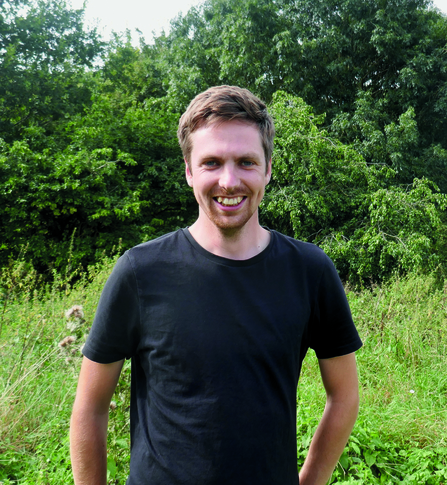
Credit: Caroline Fitton
Laurence Kidd is one of the newest members of the Wildlife Trust BCN team, working mainly at Summer Leys and the Nene Wetlands in Northamptonshire. Local Wildlife talked to him about his job, his motivation and his hopes.
Out for a duck!
“I started with the Trust in January 2021. Eight months have flown by terrifyingly quickly. I had previously worked with our neighbouring Trust, BBOWT, at College Lake, Tring, an ex-quarry that is now managed for wildlife, so working in wetlands suits me. My work now is split between the physical management of the two wetlands and engaging with visitors, from friendly regular birdwatchers to families and schoolchildren, with Summer Leys being my main focus.“
Every day is different and I have no average week, but I perhaps spend four days on habitat management. This may be cutting reeds, sedges and willows – the enemy! – to keep the water bodies open for wintering ducks and for nesting and passing wading birds; or it may be mowing the wildflower meadow, tending to footpaths and looking after the birdwatching hides. I like to keep active.”
Sports days
Laurence studied Sports Therapy at university, but has always been interested in wildlife, birds especially. “My degree would have taken me towards sports massage, but I realised that nature needed more help than overpaid footballers. I didn’t realise that conservation was a career option, but I was lucky enough to get a year’s traineeship volunteering at BBOWT. I got industry training and it was very practical and outdoors based – just what I was looking for.” Laurence still plays football and cricket, but natural history is his primary interest. “It’s the mystery that keeps me coming back to nature. You start by identifying blue tits, house sparrows and dunnocks in your garden and then find there is more to learn. One discovery leads to the next. I’ll never run out.”
Nowadays, even much of his spare time is spent in nature. “Local nature has always been important to me. Growing up in Milton Keynes and finding nesting lapwings and oystercatchers on my doorstep, I wondered: ‘Could I ever create conditions for these fabulous birds myself? Imagine that!’ Summer Leys is so bustling with birds that it fulfils all my birding needs. It’s brilliant!”
Team players
Laurence works to a reserves management plan, mainly to benefit birds as part of the Nene Valley Special Protection Area. He and Nene Wetlands Senior Ranger Toni Castello are a mini-team who help each other out on their respective reserves, but once a week they meet their colleagues, the seven other county Reserves Officers and the two Livestock Officers. Laurence also looks after two Volunteer Reserves Officers, nine-month placements much like his own first traineeship, who get training in First Aid, brush cutting and chainsaw skills among other things.“
The whole of this wider team is really helpful, both with suggestions of how to overcome obstacles and with offers of practical help. But one of the nice surprises about my job is how much freedom I am given to look after the reserve in the way I see fit. It feels good to be trusted and to put my ideas into practice. The main thing I need to do is think like a duck! They need open water and short vegetation. Ducks need to feel safe. Predators are sneaky.”
Forward pass
Summer Leys, and Laurence, have a busy future. “We’re clearing the willows from Hawthorn Island. This is right in the middle of the reserve and will make a huge difference for the birds. We hope it will encourage lapwings, redshanks, oystercatchers and common terns to nest, and we’d love to see little ringed and ringed plovers return. Of course, having cleared it once, we’ll have to keep it clear. It should also give the rest of the reserve a more open feel – better for the winter wildfowl. We are also looking forward to getting a Visitor Centre up and running. This will become the hub for all our events and education, including pond dipping and sweep netting with schoolchildren. We are hoping to start a Youth Rangers Group, giving them an area of meadow, scrub and ponds to manage by themselves. It’s so important to get hands on and connect with nature.”
There are challenges in Laurence’s role, such as dealing with litter and antisocial behaviour. He would rather spend all his time directly benefitting wildlife, but these are minor. “99% of visitors are great, and the more we reach out to people the better.”
Talking to Laurence is refreshing. When so much environmental news seems dire, it is good to find a new generation of Trust staff who not only have real hope for a wilder future, but who are also so determined to make it happen.
Rebekah O’Driscoll, Communities and Education Officer
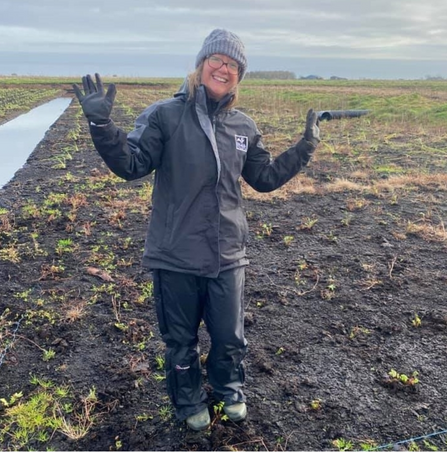
Rebekah O'Driscoll - Communities and Wildlife Officer, Great Fen
Conservation is such a wide sector, take the time to figure out what it is specifically you are really interested in. It could be monitoring, practical work, education, office-based. Get as much experience and self-development as you can.
"I started volunteering for the Wildfowl and Wetlands Trust at Welney and it was here I discovered there could be a route into conservation for me. I was advised to get a degree, so at 26 I headed back into education and got a degree in Conservation Biology. Can I be honest and say, whilst it was fascinating to learn, it's not really been a great deal of help career-wise, other than a tick in the box on the CV! Of much more importance, I've found, was the practical experience.
It was at Welney that I had met Jon Smith, who had since become Restoration Officer at the Great Fen and where he remained until his untimely passing. He heard there was a seasonal warden position available at Woodwalton Fen National Nature Reserve, working with the incredible Alan Bowley, and he recommended I apply.
I found returning to conservation challenging as a parent, as a mum. The antisocial hours and travelling for surveys weren't compatible with family life anymore and I fell back into general admin roles. I was toying around with the idea of forest school training, when the position of Communities and Education Manager came up at the Great Fen. It was an ideal role, marrying my need to be working on something of environmental value with my new responsibilities at home. I was so excited to be a part of it, having seen from my time with Natural England at Woodwalton Fen, what an amazing project it could be."
Ecology Group volunteers at Brampton Wood NR - Henry Stanier
Volunteer
Volunteering with us means joining a network of like-minded people helping to protect wildlife in Cambridgeshire, Bedfordshire and Northamptonshire and ensure a Wilder Future for all of us.
Whether you can spare a few hours or a full day, volunteering is a chance to make a real difference to local wildlife, while learning useful skills, making new friends and increasing your knowledge of wildlife conservation. The time you give makes a huge difference.
Our offices, visitors centres and activities centres
Layers
Key
Office
Activity centre
Visitor centre


